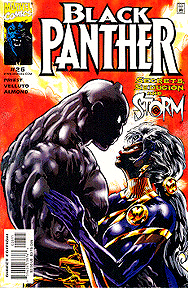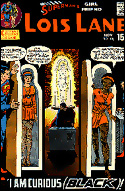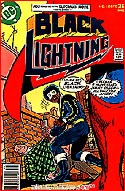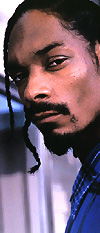|
CHAPTER NINE I am so very tired of talking about this. I stopped dealing much in interviews awhile back because every interviewer would, sooner or later, start talking to me about race in comics. I don't wanna talk about race in comics, unless it's about Superman racing The Flash. I want to be asked the same kinds of questions you ask Mark Waid. I am not so different from Mark Waid, except he has more money and dates prettier women. Few if any interviewers ever ask Mark Waid about the state of race relations in comics, but its a theme I revisit over and over, to the point where I will, likely, now decline to discuss the issue. It's just kind of... done for me. Taking a cue from Jerry Seinfeld, who retired many of his most famous routines with the HBO special I'm Telling You For The last Time, I am (hopefully) writing about racism in comics for the last time, collecting several Usenet posts on the subject, recounting several war stories, and hopefully making some kind of cohesive statement that I can now simply refer people to when they feel compelled to ask my opinion about, oh, CAGE or something. Hopefully, this will save us all a lot of angst down the line. 1. relationships for sale
Comics
starring black heroes have never been big hits.
2. white-bashing
The problem with race and popular media is this in most every "black" movie or "black street" music CD you'll see or hear, there is some hostility directed towards whites. Now, were I a white male, I certainly wouldn't want to spend eight bucks to go see a film where white males are portrayed as stupid and the butt of every joke, or where I am made to feel guilty about things I had nothing to do with, and prejudices I don't actually have. That is my pet peeve with a lot of black film and black comedians it's all White People Bashing, and it limits our opportunities. In addition to the assumption that PANTHER may be about dusty hungry kids in the desert, or that the lead character may not be someone the reader can identify with, it is possible we are also burdened with the reflexive instinct that PANTHERó by virtue of its being a "black" bookó is somehow hostile to whites.
4. stupidity
Most of this stuff was horribly offensive and completely inaccurate. As excited as I was, at 12 or 13, to see black heroes appearing on the stands, I could not for the life of me understand why Luke Cage wanted to wear a chain around his waist and say, "Christmas" all the time. Much as I applauded Tony Isabella's BLACK LIGHTNING, easily the most intelligently written of those titles (he was a school teacher and a resourceful and intelligent hero), that brilliance was undermined by the insanity of the ceremonial lowering of the afro wig onto the guy's head before he went into action. Even as a pre-adolescent, I got two messages from comics: you guys think we're all a bunch of collard greens-eating fools. There was fairly little of anything in that work that rang true of my experience as an Afro (in those days) American. Most of the work came across a bit capricious, what with Cage fighting The Cockroach and Falcon fighting Morgan, who had a penthouse atop a ratty Harlem tenement. It was beyond insipid, and possibly it was intended to be. It took me years to figure out the old Batman TV show was supposed to be goofy. That the pure, manic campiness of the show was its best asset. I just thought the TV folk were refusing to read the BATMAN comics, which read nothing at all like the show. In retrospect, I now have to wonder if the campy, near-vaudevillian un-reality of the blaxploita6tion stuff was a deliberate attempt to entertain whites, that maybe the integrity of those titles was in their camp send-up of 1970's exploitation flicks. Maybe I was just reading them the wrong way. Whatever the notion, the comics just weren't very good. And the enduring legacy of those times works against allowing our new projects the benefit of the doubt that is vital to sampling in this very tight market. The notion that black comics are not very good stems out of the companies' own shameful 1970's minstrel show.
4. the right product, the wrong market
I don't work in New York: maybe this effort HAS been ongoing at these companies. But, from out here in Colorado, it seems like the game has been to try and lure minorities into comic shops. 50 Cent and Nasir Jones are not going into your local comic shop. Many comics shop retail displays are unknowingly hostile to blacks and black culture, something I certainly could have told the industry if they'd asked me. Everything about most local comic shops fairly screams Middle Class Whites Only. There is precious little that would, at first blush, interest most urban blacks, many of whom see Superman and his ilk as icons of repression and tools for eliminating their cultural distinction. In that view, many comics shop store windows have an inadvertent effect on many black youths. It is a kind of violence, much the same way loud music from gangsta jeeps is. Putting your minority-focused retail product inside these storesó many of which present the appearance of bunkers, their windows papered over with white iconic characters leaping and jumping and zapping and Magik The Gatheringó is an utter waste of time. Publishing one or two black titles amid your line of 60+ white-themed monthlies is not enough to overcome the stigma many black youths feel walking into places like that. Places where blacks are whispered about and followed not so much because they are black but because they are new, because they are not regulars, so there is this awkward tribal introduction where the retail staff tries to bridge that gap. But, to many blacks, surveillance is surveillance, and this awkwardness feels one step away from a police call, handcuffs and Rodney King. The hair on the neck going up because the comic shop, by inadvertent design, often represents white culture in an intensely megalomaniacal way. To many blacks, he is not Superman so much as he is SuperWhiteMan. There's no sign on the window that reads WHITE POWER, but the sensibility is implied: these are power fantasies for whites. white power fantasies. And, whatever the reason for the polarizing discomfort in many comic shops, the fact is the black kid looking for copies of Icon tends to stand out because he is outside of that shop's regular customer stream, outside of their tribe. And they instantly know this kid is outside of their tribe because he's black. The retailer is damned if he does and damned if he doesn't reach out to the newbies because ignoring these kids is just as bad if not worse. The tension continues to build as the retailer chats up his regulars while giving the new black kid room to browse, an action the new black kid could take as racist as, surely the retailer knows he's a new customer. But if the retailer reaches out, that could be taken the wrong way, as a lot of retail sales help have been traditionally instructed to shadow blacks in stores (as recently as last year I was followed around a trendy department store here while I was looking at, ghah, ties. This moronic sales guy, ignoring everyone else in the department, was never more than three feet from me, pretending to fold things and constantly asking me what I was looking for. I said, "This is... the tie department, yes? I'd like a toaster." Then I handed him my business card, REVEREND CHRISTOPHER J. PRIEST, and encouraged him to run a background check while I wrestled with the eternal struggle of paisley or not paisley). However well meaning the comics retailer, the truth is most comics stores are ill-equipped to service the very community Marvel and DC are trying to lure in. You have to go to them. You have to find out where Q-Tip and Dirty Ol' Bastard buys their kicks (shoes) and get the product in there and make it appealing to and non offensive to that audience. The black community spends an AWFUL LOT OF MONEY. Not all of it on malt liqueur and chicken wings. But, right now, they are not spending it on comic books. Comic books have traditionally had a limited appeal to minorities because we see so little truth in them, so very little of who we are. Inaccurate and transparently indifferent approaches, exploitative rip-offs and, at best, well-meaning cluelessness. Maybe the companies are trying to penetrate the minority market. Lord knows I hope so. I'm just not aware of what's going on because nobody talks to me about it. I've been told, in the past, by comics industry staffers, that I "wasn't black enough," ostensibly because I don't talk in broken sentences or use Ebonics. I explained to these clueless wonders, who were making polite sport of me, that I don't talk like that around them. because if I did talk like that around them, I'd still be the key operator for the Xerox machine. But, yes, I am quite versed in the language and culture of urban blacks. And I deeply resent the vivid concept, still apparently alive and entrenched in this business, that black = street, that black = poor, that black = J.J. from Good Times. The most recent evidence of this thinking was the widely-publicized complaint that T'Challa,
the Black Panther, was, somehow, "not black enough," quoted in the fan press from mysterious "inside sources." It's deeply disappointing to realize the ignorance of some people, who consider bad grammar and underachievement a staple of black culture, malt liqueur and chicken wings the litmus test of blackness. To say that about an African King, from an unbroken hereditary lineage of an unconquered nation, one of the most technologically advanced nations in the world, is the height of ignorance. That I must somehow demean T'Challa and dumb him down to make him more credibly "black" is the most insidious brand of racism imaginable. Nobody at Marvel ever asked me to do that. Nobody at Marvel ever said to me or to anyone who could credibly report to me that T'Challa wasn't black enough. And Marvel stood with the book for over five years, stood with it when the notoriously color and content-blind bean counters were demanding Panther's head on a pike. I'm very grateful for Marvel's investment in this book, in what the book represents and in allowing us to tell the kinds of stories about this most noble of persons. That it never found a wider audience is more a function of where the industry is right now than any caprice on the part of the company.
There has not existed, to my knowledge, a marketing person at the majors with any real knowledge of the enormous untapped black and Latino markets. Completely untouched by Marvel or DC, and nobody has any clue how to reach them or that there's even any money there.
I'd be happier
about this renewed effort to produce black comics if there was an equal
effort to penetrate black markets and get these books into the hands of
people who might appreciate them for more than their sensational value. Just
as the question of who was the first black to work in modern super-hero
comics is both relevant and important to the black community, comics
starring minority characters need to have both credibility and substance,
and somehow penetrate the mainstream of commercial merchandising to the
black community. Christopher J.
Priest Priest's adventures in the comics trade continue in:
|
|
TOP OF PAGE |
 The fact is, not enough people have the same warm spot in their heart for BLACK PANTHER as they do for SPIDER-MAN, or THOR. That's just the way it is. I'm black, and I did not have the warm spot for PANTHER. Growing up, I found Panther incredibly dull, and he got his ass kicked a lot, and Joe and Jimmy had to overcome that stigma, that net impression, to get me to suit up. Now Sal and Bob and The Two Mikes and I have to overcome that stigma with Marvel's larger fan base, a stigma that is real and visceral because I personally experienced it. These days we sell BLACK PANTHER one new reader at a
time.
The fact is, not enough people have the same warm spot in their heart for BLACK PANTHER as they do for SPIDER-MAN, or THOR. That's just the way it is. I'm black, and I did not have the warm spot for PANTHER. Growing up, I found Panther incredibly dull, and he got his ass kicked a lot, and Joe and Jimmy had to overcome that stigma, that net impression, to get me to suit up. Now Sal and Bob and The Two Mikes and I have to overcome that stigma with Marvel's larger fan base, a stigma that is real and visceral because I personally experienced it. These days we sell BLACK PANTHER one new reader at a
time. Most people
want to read comics or see movies or listen to music they can immediately
identify with, and I'm guessing a great majority of people who have never even
tried PANTHER have an instinctive notion that they will not be able to identify
with the character. But people universally identify with Michael Jordan or
Michael Jackson or Muhammad Ali.
Most people
want to read comics or see movies or listen to music they can immediately
identify with, and I'm guessing a great majority of people who have never even
tried PANTHER have an instinctive notion that they will not be able to identify
with the character. But people universally identify with Michael Jordan or
Michael Jackson or Muhammad Ali. During
the "blaxploitation" craze of the 1970's, Marvel and later DC
rushed to put out numerous books starring black characters. The problem was
not that these books were conceived and written by whites, but that they
were, in large measure, written and conceived by whites who apparently had
never actually met a black person, but had learned about our culture
from, say, the TV show Good Times.
During
the "blaxploitation" craze of the 1970's, Marvel and later DC
rushed to put out numerous books starring black characters. The problem was
not that these books were conceived and written by whites, but that they
were, in large measure, written and conceived by whites who apparently had
never actually met a black person, but had learned about our culture
from, say, the TV show Good Times.  Comics have never successfully penetrated the African American market, so the numbers don't encourage
the major companies to pursue what is, statistically, a dead end. I see that as more economics than racism.
There's just not a viable enough audience to sustain black-themed comic
books, and that is the watery grave that awaits all "black" books until the major companies finally learn how to market to audiences outside of their traditional comic shops. Sean "P Diddy" Combs is about as untalented as they come, and he makes millions if not billions per year. There's SO MUCH MONEY out there in the minority community, but to go after it, Marvel and DC and everybody else is really going to have to reinvent themselves, change the way they do business and operate way, way outside of their traditional orbit. It would help if they'd actually hire some minorities and consultants on distribution channels for minority-focused products. Until they make a real effort with this, "black" books, "minority" books and female books (other than the gross T&A variety) are doomed out of the gate. Comics, as we know them, have, for 65 years, been produced by middle class whites for middle class whites. There's greater potential sales in the Latino community alone than in the entirety of our known distribution channels combined. One real Latino hit would, potentially, outsell everything on the racks if it were *good,* if it didn't insult the intelligence of the community it proposes to entertain, and if the companies could figure out how to get that book into the distribution channels that service that community.
Comics have never successfully penetrated the African American market, so the numbers don't encourage
the major companies to pursue what is, statistically, a dead end. I see that as more economics than racism.
There's just not a viable enough audience to sustain black-themed comic
books, and that is the watery grave that awaits all "black" books until the major companies finally learn how to market to audiences outside of their traditional comic shops. Sean "P Diddy" Combs is about as untalented as they come, and he makes millions if not billions per year. There's SO MUCH MONEY out there in the minority community, but to go after it, Marvel and DC and everybody else is really going to have to reinvent themselves, change the way they do business and operate way, way outside of their traditional orbit. It would help if they'd actually hire some minorities and consultants on distribution channels for minority-focused products. Until they make a real effort with this, "black" books, "minority" books and female books (other than the gross T&A variety) are doomed out of the gate. Comics, as we know them, have, for 65 years, been produced by middle class whites for middle class whites. There's greater potential sales in the Latino community alone than in the entirety of our known distribution channels combined. One real Latino hit would, potentially, outsell everything on the racks if it were *good,* if it didn't insult the intelligence of the community it proposes to entertain, and if the companies could figure out how to get that book into the distribution channels that service that community.